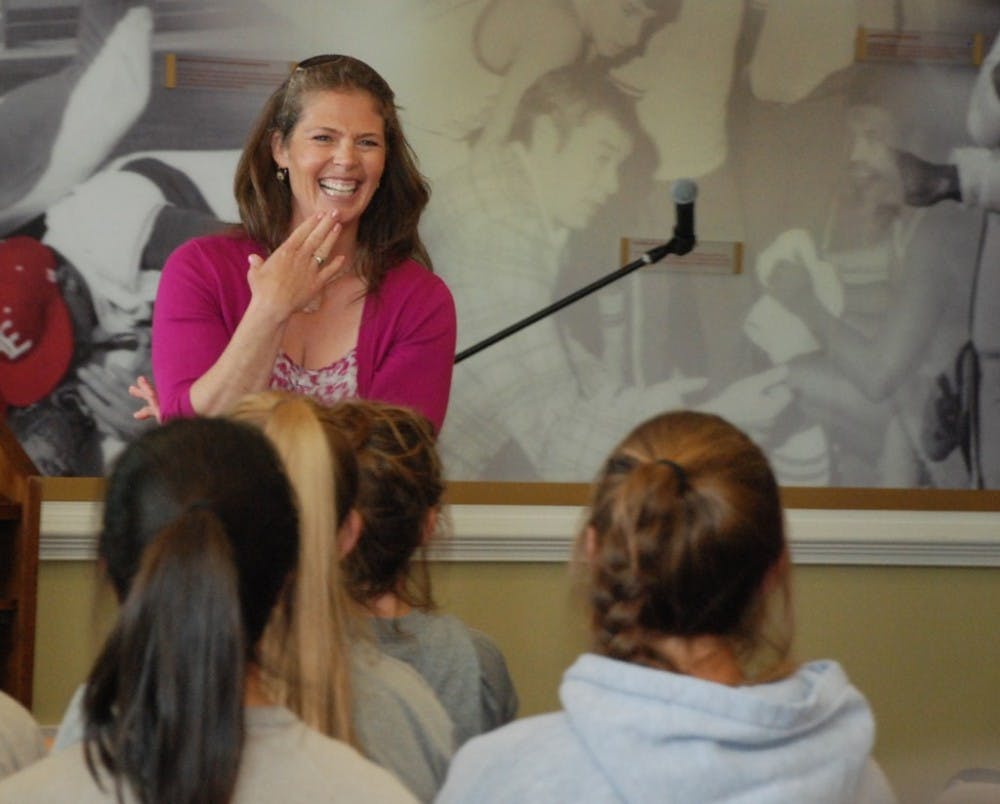“Athletes, love it!” is how former Olympic gold medalist Picabo Street introduced herself to the assembly gathered in the Walker Room of Alumni Fieldhouse at Elon University.
She seemed right at home.
Street came to Elon’s campus to talk to Elon athletes about injuries and other things that relate to athletes. Members of the men’s basketball, women’s soccer, women’s basketball and volleyball teams were in attendance.
“You want to be on the US team and go to the Olympics, like I did,” she said. “Chase your dreams, and remember, you’re perfect exactly how you are. Charge into the game, keep it real and be true to you.”
Street, an alpine skier, won the gold medal in the super G at the 1998 Winter Olympics in Nagano, Japan, and the downhill at the 1996 World Championships in Sierra Nevada, Spain. She also earned a silver medal in the downhill at the 1994 Winter Olympics in Lillehammer, Norway, and was inducted into the National Ski Hall of Fame in 2004.
Street has suffered concussions, ACL tears and other countless injuries. To junior Cali Estes, a member of Elon’s women’s volleyball team, it made what she had to say relatable. Estes is dealing with a torn ACL in her leg.
“This has been a really long road for me, so it’s cool to hear her name all the different injuries she’s been through and then say it’s not a big deal,” Estes said. “She’s gone back and then recovered and won a gold medal. It’s easy to relate to.”
Estes was sitting on the front row and was “picked on” by Street throughout the talk about her injury. She laughed about it, much like the other athletes. Street’s jokes and loose manner of speaking kept the athletes loose.
“She could be a stand-up comedian or something,” Estes said, laughing.
Another athlete that got picked on was freshman Austin Hamilton, a guard on the men’s basketball team. One of the injuries that Street suffered was a broken scaphoid bone, an injury that Hamilton got surgery for April 11.
When Hamilton brought this to her attention, Street said, to laughter, “You’re going to be dealing with the rest of your life, sorry. You’re on for the ride with that one.”
Street encouraged athletes to be transparent with their injuries, even when they may not want to.
“You’ve got the resources here to find where the imbalances are in your body and how you can move forward to getting a full-blown physical output, 100 percent,” she said. “You’ve got to listen to (your body).”
She also said that it was important to deal with the ups and downs of being an athlete, including injuries, by talking to others about “everything.”
“You’re not going to do it on your own,” she said. “You’re going to need somebody to create a relationship with who knows your body well. If you think you’re bringing your ‘A’ game, and the rest of the team thinks you’re bringing your ‘B’ game, you’re going to need to sit down and talk about it.”
Being an athlete that participated in a mostly individual sport, Street encouraged those in attendance to strive for their own personal best, but not while being disrespectful of others.
“You want to rise above,” she said. “You’re on a team, but you want to be the best. That’s fine! Just be calm and respectful. Don’t step on people’s toes. If you do, you’ll get your a— beat.”
Lastly, she emphasized the importance of being a good person and giving “fifteen affectionate exchanges a day.” She also said it was important to keep going through the tough times.
“It’s all about getting fired up and going,” Street said. “You’ll learn so much more about yourself and what you’re capable of in the rough times and the losses than in the good times and the wins.


